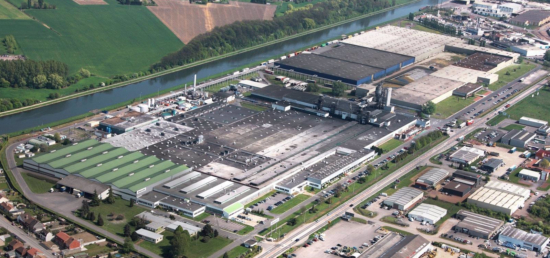Bridgestone to close Bethune, France plant
 Bridgestone plans to cease production at Béthune in the second quarter of next year, pending its discussions with employee representatives (Photo: Bridgestone)
Bridgestone plans to cease production at Béthune in the second quarter of next year, pending its discussions with employee representatives (Photo: Bridgestone)
Closure could affect 863 employees as manufacturer brings to end nearly 60 years of tyre manufacturing at site
Bridgestone has announced its plan to close its Béthune plant in France. The manufacturer said that the measure is being used to reduce production overcapacity and to improve cost efficiency. The proposal could affect 863 employees. Bridgestone added that it is “fully aware of the social consequences of this project and is committed to using all means at its disposal to define support plans for each employee.” The earliest the closure would take place is the second quarter of 2021. Bridgestone’s presence in France would continue through sales and retail operations, in which it employs about 3,500, the company said.
“Closing the Béthune plant is not a project we are taking lightly. But there is no other solution to overcome the challenges that we are facing in Europe. This is a necessary step to ensure that we preserve the sustainability of Bridgestone’s business in Europe,” said Laurent Dartoux, CEO of Bridgestone EMIA.
“We are fully aware of the implications of the announcement made today and of the consequences that it could have for the employees and their families. This project is no reflection on the engagement of the employees, nor on their many years of commitment to delivering high quality products for our customers, it is a direct result of a market situation that Bridgestone needs to address. The priority is clearly to find a fair and adapted solution for all the employees by offering each of them individual support, as well as solutions consistent with their personal and professional projects.”
Béthune closure in context
Bridgestone said it had made the decision “after carefully studying all the potential options.” It describes Béthune’s closure as “the only viable path to safeguard the competitiveness of Bridgestone’s operations in Europe.”
The closure be processed “in close consultation and through sustained dialogue with employee representatives,” Bridgestone adds. It will propose “preretirement measures, support for the reassignment of employees to other Bridgestone activities in France and initiatives to facilitate external redeployment” after discussion with employee representatives in the coming months. Bridgestone says it intends to “minimise the impact on the region as much as possible by deploying a solid employment revitalisation plan for the area.” It will establish a dedicated outplacement program and seek a buyer for the site.
Bridgestone said that the current industry context for passenger tyres is threatening its competitiveness in the European market. It has previously attempted to tackle the “strong headwinds” that existed pre-Covid-19 via measures to increase the Béthune plant’s competitiveness, but these have proved insufficient to make the plant profitable. Bridgestone says it has “been losing money on tyres produced in Béthune for several years.” Given the additional effects of Covid-19 on market dynamics, “no improvement in the situation is foreseeable,” Bridgestone concluded.
Analysing the pre-existing headwinds, Bridgestone added that the market has seen its volumes stabilise over the last few years, with average annual growth under 1 per cent. Competition from “low-cost Asian brands continues to increase,” it adds. Such brands have increased market share from 6 per cent in 2000 to 25 per cent in 2018, which has led to “general production overcapacity.” In turn this has “resulted in pressure on pricing and margins, as well as overcapacity in the low rim diameter segment, given declining demand. Within Bridgestone’s overall European footprint, it said, “the Béthune plant is the least well positioned and least competitive.”
History of Béthune
Firestone opened the Béthune plant in 1961, bringing investment and employment to a region of northern France that had been hard hit by mining closures. Béthune initially produced 4,000 Firestone tyres a day, employing 640 people. Capacity expanded steadily and reached a daily output of 12,500 tyres by 1973. The factory produced its first Bridgestone brand tyre in 1991 following its global acquisition of Firestone, as production increased to 22,000 tyres a day.
The plant celebrated its 50-year anniversary in 2011, by which point it had produced more than 241 million tyres, employing 8,700 people, some of them from three generations of the same family. It was by this point the largest employer in Béthune and the third largest manufacturing employer in the Pas-de-Calais region of France. With three-quarters of production dedicated to high-performance and winter car tyres, production in 2011 reached 25,000 tyres a day with a workforce of 1,300. Bridgestone’s ultimately unsuccessful measures to increase the plant’s competitiveness over the course of the last decade have seen the number of employees reduced by just under 500 to current levels.


Comments